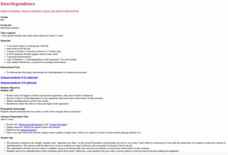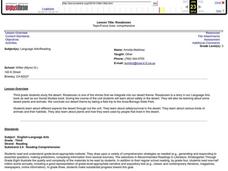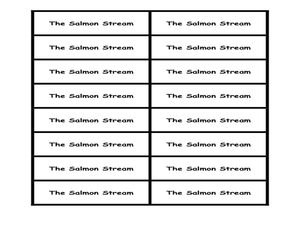Curated OER
Inside the Egg, Hatching Chickens
Students conduct an egg candling activity to show the life inside a fertile egg. Students discuss the needs the egg has of the hen, as well as similarities and differences between plants and animals. Students complete a life cycle wheel...
Curated OER
History of the Earth
Students work together in groups to research the characteristics of the Mesozoic Era. Using various sources, they must include information about climate, landforms, plants and animals found during this time period. They create a...
Curated OER
Kidney Structure and Function: removing intracellular waste
Your class will learn all about the function of the kidney and how it operates in animals from different habitats. The methods of absorption, filtering and excretion are detailed and pupils will learn of the different disposal methods...
Curated OER
Form and Observation
Use a familiar song and adorable baby animal pictures to teach youngsters about genetic variation. Begin by listening to "Twelve Variations on 'Ah vous dirai-je Maman,'" which you will need to find online (there are several versions...
Curated OER
Interdependence: Discovering What Makes a Balanced Ecosystem
Students demonstrate that plants and animals are interdependent in a balanced ecosystem.
Curated OER
Investigating Local Ecosystems
Students investigate the habitats of local plants and animals. They explore some of the ways animals depend on plants and each other. Students observe living organisms in a local ecosystem and create detailed drawings and descriptions...
Curated OER
Bringing the Rain to Kapiti Plain
Learners identify the African Plains and the plants and animals that are found on the plain, which are of a benefit to humans. They listen to the story and actively participate in a choral reading of Bringing the Rain to Kapiti Plain.
ARKive
Temperate Rainforest in the Pacific Northwest
Explore the amazing temperate rainforest of the Pacific Northwest. Your class starts by investigating the animals and plants of the Northwest, specifically Washington, and then research an animal population common to the area. In small...
Curated OER
Summer Camp in the Classroom
Students explore wildlife plants and summer activities. In this natural science lesson, students identify plants and animals and create a scrapbook of their findings.
Curated OER
Fabulous Fossils
Seventh graders investigate how fossils are formed and discuss how scientists determine the appearance of ancient plants and animals. They make fossils of everyday objects for others to identify. They make spreadsheets to display fossil...
Curated OER
Classification 2: A Touch of Class
Young scholars examine how many kinds of living things (e.g. plants and animals) can be sorted into groups in many ways using various features to decide which things belong to which group and that classification schemes vary with purpose.
Curated OER
Vanishing Rainforests: How can We Save Them?
Students focus in on the Amazon Rain forest. They research about various plants and animals that exist in our rain forests. Students develop knowledge of resources that come from our rain forests. They analyze the cause/effect of rain...
Curated OER
Roxaboxen
Third graders discuss the story "Roxaboxen." In this reading comprehension lesson, 3rd graders discover new vocabulary words, discuss the story using story mapping, and take a reading test. Students investigate safety in the desert and...
Curated OER
Food Chain
Fourth graders explore the concept of food chains. In this food chain lesson, 4th graders discuss what different animals eat and how they are all connected. Students explore a garden and the environment around them to find examples of a...
Curated OER
Living in the Desert
Conduct an investigation on the plants used by the Hohokam tribe. To survive in the harsh desert environment the Hohokam used many natural resources. Learners read, research, map, and graph multiple aspects of Hohokam plant use as a...
Alabama Learning Exchange
Good Litter, Bad Litter
Which ones can be thrown on the ground? Discover the difference between natural litter and unhealthy trash, helping scholars by using several examples. Use the information here to give them a basic background, but also encourage prior...
Utah LessonPlans
Water, Please!
Students use a globe and cups of water to illustrated the amount of water versus land on earth and the amount of fresh versus salt water available to plants and animals.
Curated OER
Number Scouts
What makes up a community? People, of couse. Then there are the other living things, such as plants and animals. There are also buildings, streets, schools, businesses, and vehicles. This activity makes students aware of one othe...
Curated OER
Water Pollution
Learners investigate a variety of pollutants that can affect water and the plants and animals that live in the water. In this water pollution lesson plan, students identify pollutants in a bog, marsh, stream or other wetland area and...
Curated OER
Geography Experience: Low Vision
The world is a big and beautiful place; but how do you begin to understand it when you have low vision? Here is a great set of ideas focused on transforming any small room into a sensory paradise, themed to incite understanding about...
Curated OER
The Salmon Stream and Vegetation
Students explore the ecosystem and food chain by researching Pacific Salmon. In this fish habitat lesson, students discover the life cycle for salmon, where they spawn and what they eat to survive the harsh elements. Students participate...
Curated OER
Local Animal Sort
Students examine the concepts of sorting and classifying animal. They use familiar animals to determine the connections between physical characteristics and categorization.
Curated OER
Farming Number 6
In this environment worksheet, students identify and explain the importance of water and farming. They identify the differences between food items and whether they are a fruit, vegetable, or animal. Students also respond to 5 yes/no...
Curated OER
Life Cycles
Using computers, Students work in small groups and progress through the roles of Explorer, Researcher, Designer, and Evaluator as they study the life cycle of plants, insects, butterflies and frogs.

























